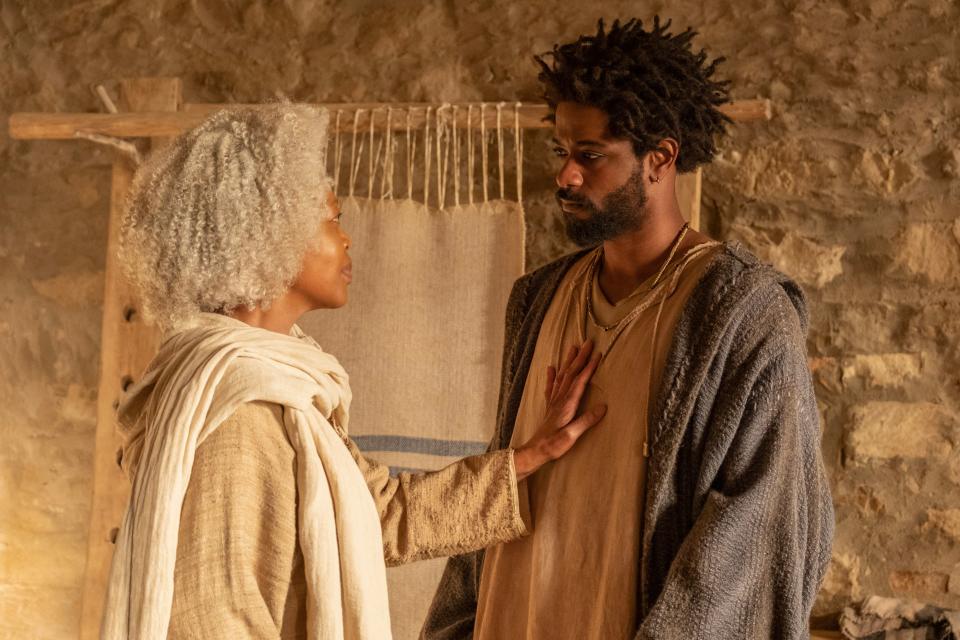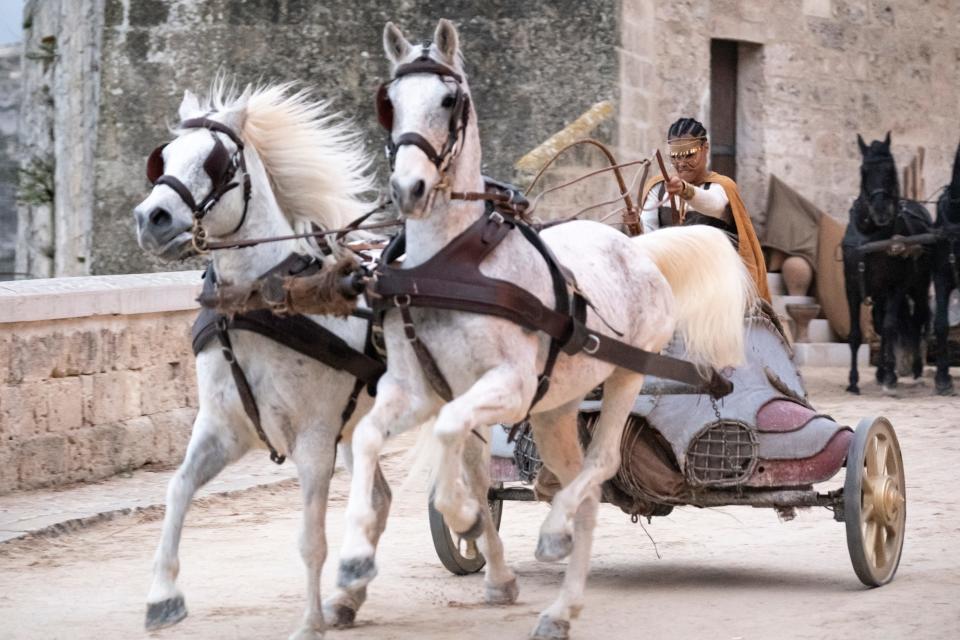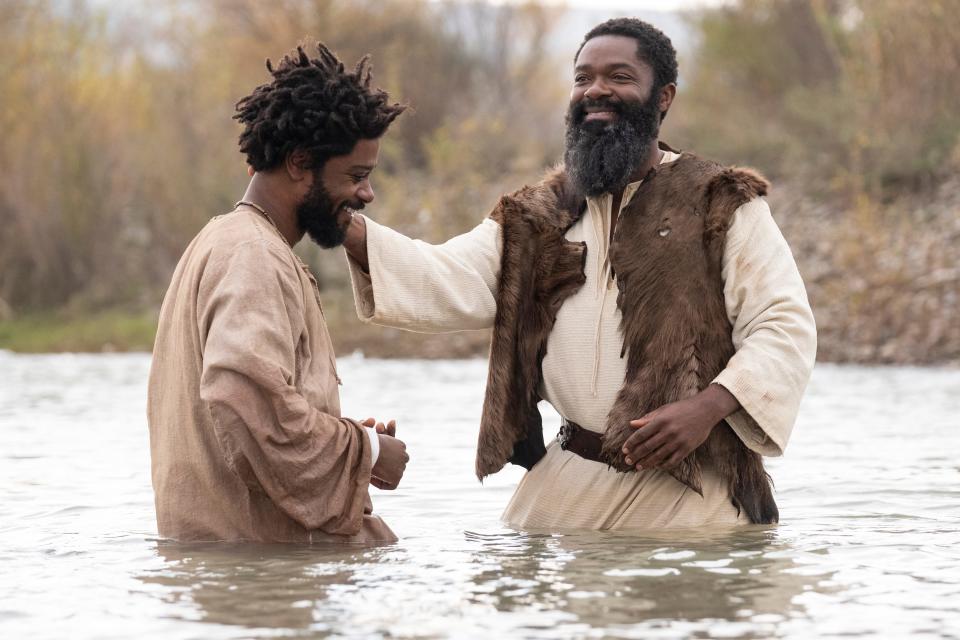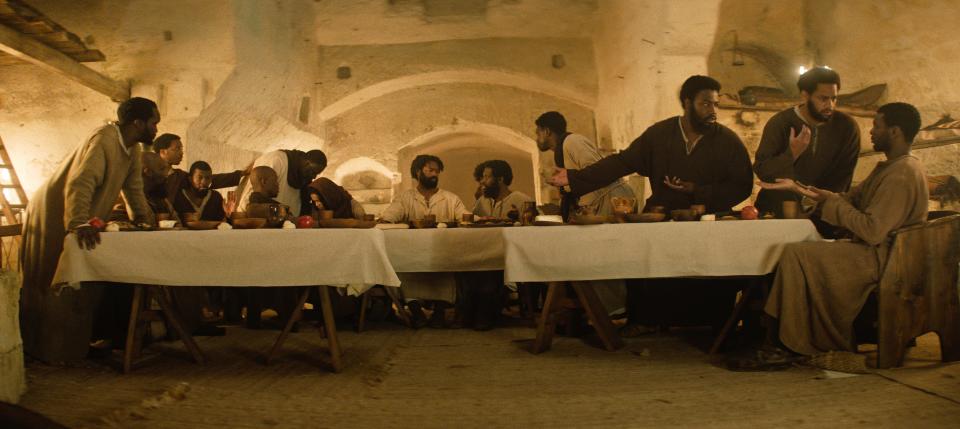How 'The Book of Clarence' brings 'majesty' back to the Hollywood biblical epic
- Oops!Something went wrong.Please try again later.
- Oops!Something went wrong.Please try again later.
The new movie "The Book of Clarence" brings the Hollywood biblical epic back in style, complete with its own commandment: Thou shalt keep the faith.
After putting a signature spin on the American Western with Netflix’s “The Harder They Fall,” British writer/director Jeymes Samuel has crafted another period reinvention – in this case, set in the time of Jesus Christ – with the thoughtful and irreverent “Clarence” (in theaters Friday). The movie revisits Jerusalem in A.D. 33, through the lens of Black culture, to tell an Everyman story anyone can relate to, whether you’re a believer or not.
“I’ve never understood why they stopped (making them),” Samuel says of sweeping Bible-based films, which were as popular as superhero movies during the golden age of Hollywood. “It’s not based in mythology, it's based in a religious belief. And in that way, they lend you a sense of wonder and miracle that is usable in your everyday life. You could adopt that kind of majesty in a way that a sci-fi movie really can’t.”

LaKeith Stanfield stars in the dramedy as Clarence, the streetwise twin brother of Thomas (also Stanfield), one of Jesus’ 12 apostles, who envies the son of God and his followers' celebrity in Jerusalem. Deeply afraid of being a “nobody,” he tries to become a 13th apostle, and when that fails, he and pal Elijah (RJ Cyler) scheme to present Clarence as “the new messiah” and repackage Jesus’ miracles as his own.
It’s not exactly like Samuel’s favorite biblical movies from the past, like “Ben-Hur” or “The Greatest Story Ever Told.” Then again, “I don't know anyone that looks like Charlton Heston or the great Max von Sydow,” the director says. “But I know people who look like Clarence.”
LaKeith Stanfield's Clarence is inspired by a biblical sibling

Samuel has created a long-ago Jerusalem unlike any seen previously on film, with contemporary touches such as street-racing chariots, cruel white Roman cops, nightclubs with funk dancers and Newer Testament dialogue (“I’ve got the cobblestones on lock"). And plopped amid this reimagined setting is Clarence, the storytelling anchor inspired by Samuel’s knowledge (born from growing up in a religious family) that Thomas had an unnamed twin. “I was always drawn to the minutiae of the Bible tales that we weren't told,” he says. “Like where did Jesus buy his sandals? Where would Mary Magdalene get her hair done?”
Clarence starts out wanting to better himself to help his mom (Marianne Jean-Baptiste) and be worthy of his love Varinia (Anna Diop), and goes on a quest full of humorous episodes and deep understanding. “Walking in his shoes, or sandals for that matter, it just resubstantiated things that I already innately knew, but maybe weren't at the surface: the idea that you have to stay the course and that faith is a very powerful thing,” Stanfield says.
'American Fiction': Jeffrey Wright aims to 'electrify' conversation on race, identity
David Oyelowo plays John the Baptist as a 'crazy man'

His character also interacts with (and learns from) versions of actual biblical figures. Samuel has a Black Jesus (Nicholas Pinnock) in the movie as well as the Virgin Mary (Alfre Woodard), Mary Magdalene (Teyana Taylor) and others. Samuel wanted to explore these famous figures – or infamous, in the case of Judas (Micheal Ward) – with a more rounded vantage point.
“I wouldn't have been one of the 12 apostles. I don't know anyone that Jesus would've chosen worthy of that 12,” he says. “So Judas must have been a really good guy that did one bad thing that the whole world remembers him for forever. We just know that he betrayed Jesus. We don't ever talk about why he betrayed him.”
A devout Christian, David Oyelowo plays John the Baptist, who slaps Clarence, calls him a “highfalutin nincompoop” and also dunks him forcefully in the water when Clarence tries to be baptized.
“He is in some ways a crazy man,” Oyelowo says of the holy figure. “He's wearing camel hair and eating locusts and screaming in the wilderness. These are things that are within the Bible. But he's also deeply rooted in his faith in Jesus. It felt like an opportunity to both have fun but also go to the essence of who John the Baptist is and was.”
'The Book of Clarence' is more aspirational tale than 'religious story'

The biblical epic is as universal a genre as you can get, Oyelowo adds. “The Bible is and remains the bestselling book of all time, so that's pretty good IP when it comes to telling a story.” But given his strong beliefs, he spoke with Samuel at length to make sure the film wouldn’t be disrespectful or preachy.
“I’m not interested in making films that proselytize, and therefore are alienating to a certain part of the audience,” Oyelowo says. “What I love about the ‘Book of Clarence’ is that anyone and everyone is represented in some way, whether you are completely skeptical or steeped in your own faith.”
“Faith-based” films are popular in the cinematic marketplace, though Stanfield feels “Clarence” is “not really a religious story at all.” While there is an important “closeness to Jesus,” the movie focuses on working on ourselves while having “a more intimate relationship” with one’s own spirituality.
“It’s like, what do you believe versus what do you know?” Stanfield says. “What is your philosophy? What carries you through life? Those are important questions.”
This article originally appeared on USA TODAY: 'The Book of Clarence' gives the biblical movie a modern makeover

